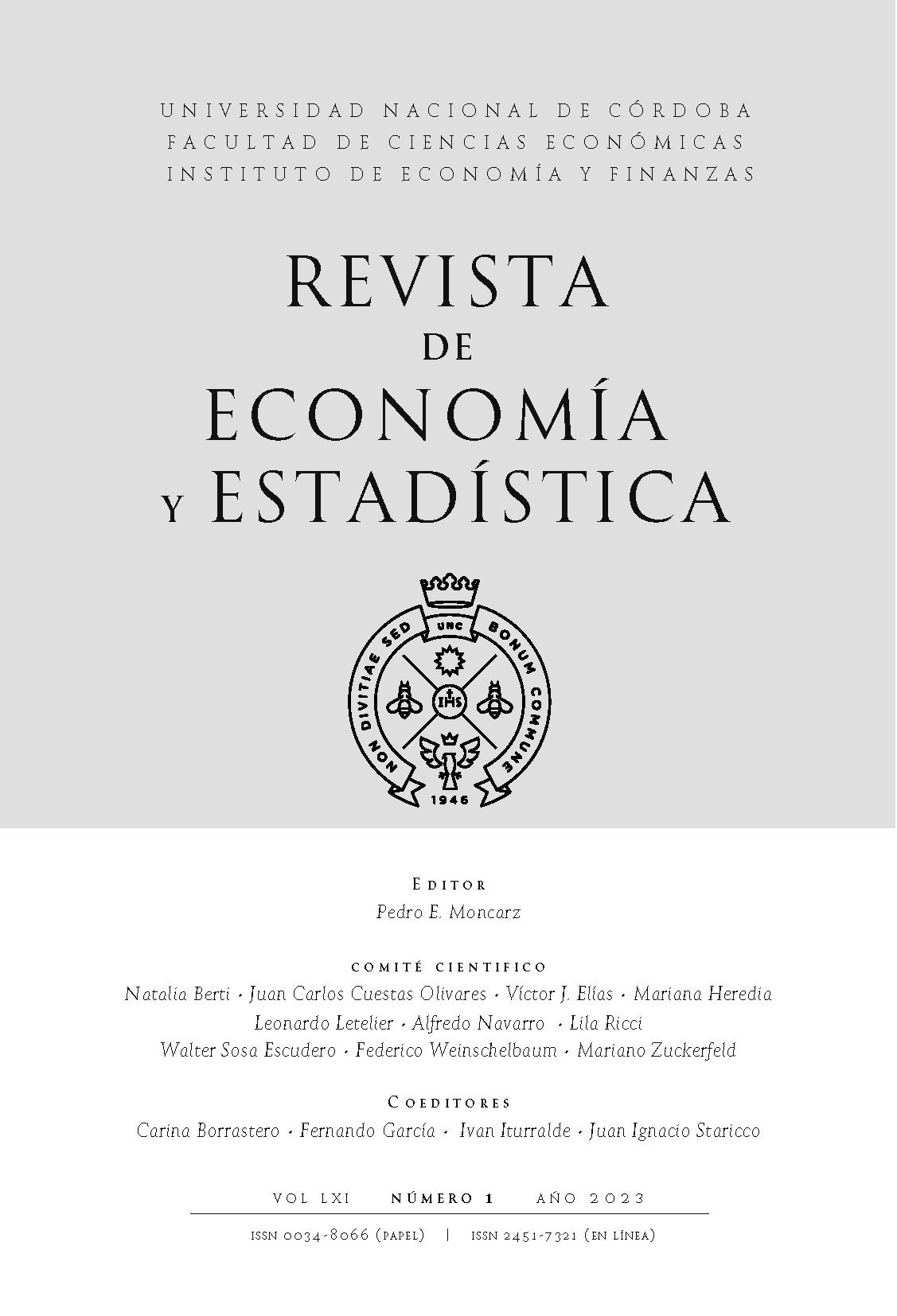The economy of attention: from the reconfiguration of power relations to social control
DOI:
https://doi.org/10.55444/2451.7321.2023.v61.n1.44196Keywords:
Economy of attention, Social networks, Social controlAbstract
The information surplus generated by the explosion of new information and communication technologies to which society is exposed has led to an unprecedented attention shortage. Technological oligopolies compete with each other with the intention of capturing social attention and keeping users looking at their content for as long as possible. In this context, the use of algorithms and other tools that design personalized instant gratification seems to be directing people's will and intervening in decision-making. Therefore, the purpose of this article is to carry out a bibliographic review and some reflections on the consequences and challenges that the attention economy poses for democracy and collective identities, mainly in relation to social control.
Reception date: 21/09/2023
Acceptance date: 16/11/2023
Downloads
References
Adamovsky, E., Aguiton, C., Berlinguer, M., Calle, Á., Morell, M. F., Galdon, G., Holmes, B., Reyes, O., Subirats, J., Wainwright, H., (2007). Repensar la política en la era de los movimientos y de las redes. Icaria Editorial.
Adorno, T. W., & Horkheimer, M. (2002). The culture industry. Routledge.
Angenot, M. (2012). El discurso social: los límites de lo pensable y lo decible. Siglo XXI Editores.
Appadurai, A. (2000). Grassroots globalization and the research imagination. Public culture, 12(1), 1-19.
Betancourt, V. (2011). Ciberactivismo: ¿Utopía o posibilidad de resistencia y transformación en la era de la sociedad desinformada de la información?. Chasqui: Revista Latinoamericana de Comunicación, (116), 94-97.
Boellstorff, T. (2020). Repensar la antropología digital. En Antropología digital (págs. 39-60). Routledge.
Castells, M. (2001). Internet y la sociedad red. La factoría, 14(15), 1-12.
Castells, M. (2009). Comunicación y poder. Alianza Editorial.
Castells, M. (2012). Redes de indignación y esperanza. Madrid: Alianza Editorial.
Castro, E. (2018). Diccionario Foucault: temas, conceptos y autores. Siglo XXI Editores.
Celis Bueno, C. (2017). Economía de la atención y visión maquínica: hacia una semiótica asignificante de la imagen. Hipertextos, 5.
Chaves-Montero, A., Aiello, W. F. G., Hernández-Santaolalla, V., Mármol, I., Mejía, S. G., Marín, A. A. & Eguizabal, F. A. L. (2017). Comunicación política y redes sociales. Ediciones Egregius.
Dahl, R. (1992). El problema de la competencia cívica. Diario de la democracia , 3 (4), 45-59.
Deleuze, G. (1995). Negotiations 1972-1990. New York: Columbia University.
De Moraes, D. (2010). Mutaciones de lo visible: comunicación y procesos culturales en la era digital. Paidós.
Downs, A. (1957). An economic theory of democracy.
Giraldo Luque, S., & Fernández-Rovira, C. (2020). Redes sociales y consumo digital en jóvenes universitarios.
Foucault, M. (1999). Microfísica del Poder. Editorial la Piqueta.
Gramsci, A. (1968). Prison Notebooks. Lawrence and Wishart.
Gramsci, A. (2004). Antología. Siglo XXI.
Guattari, F. (2004). Plan sobre el planeta: Capitalismo mundial integrado y revoluciones moleculares. Madrid: Traficantes de Sueños, 2004.
Guattari, F. & Rolnik, S. (2006). Micropolítica: cartografías del deseo. Edición Traficantes de Sueños.
Haesbaert, R. (2019). Regional-Global: dilemas de la región y de la regionalización en la geografía contemporánea. Universidad Pedagógica Nacional.
Hall, S. (1984). Notas sobre la desconstrucción de lo popular. Publicado en SAMUEL, R. (ed.). Historia popular y teoría socialista, Crítica, Barcelona.
Han, B. C. (2014). Psicopolítica: neoliberalismo y nuevas técnicas de poder. Herder Editorial.
Hernández Conde, M. (2020). Ni michismi ni fiminismi, la influencia de los memes y la remezcla en el discurso contrahegemónico de los feminismos en el 8M. En Ciberactivismo, libertad y Derechos Humanos. Retos de la democracia informativa. XI Congreso Internacional ULEPICC (2020), p 185-208. ULEPICC.
Lago Martínez, S. (2015). Movimientos sociales y acción colectiva en la sociedad red. Chasqui 128. 113-130. http://hdl.handle.net/10469/13409
Lanier, J. (2011). Contra el rebaño digital: un manifiesto. Debate.
Lefebvre, H., Lorea, I. M., & Gutiérrez, E. M. M. (2013). La producción del espacio. Madrid: Capitán Swing.
Lennie, J., & Tacchi, J. (2013). Evaluating communication for development: A framework for social change.
López García, G. (ed.) (2005). El ecosistema digital: Modelos de comunicación, nuevos medios y público en Internet. Servei de Publicacions de la Universitat de València. Disponible en http://www.uv.es/demopode/libro1/EcosistemaDigital.pdf
Martín-Barbero, J. (2001). De las políticas de comunicación a la reimaginación de la política. Nueva Sociedad, 175, 70-84.
Martín-Barbero, J. (2003). La globalización en clave cultural. Una mirada latinoamericana. Revista Renglones. 53, 18-33.
Martín- Barbero, J. (2009). Culturas y comunicación globalizada. Revista Científica de Información y Comunicación, 6(1), 175-192.
McChesney, RW (2008). La economía política de los medios: problemas duraderos, dilemas emergentes. Prensa de la Universidad de Nueva York.
Miller, D., & Horst, H. A. (2020). The digital and the human: A prospectus for digital anthropology. In Digital anthropology (pp. 3-35). Routledge.
Offe, C. (1992). Los nuevos movimientos sociales cuestionan los límites de la política institucional. Partidos políticos y nuevos movimientos sociales, 163-239.
Pariser, E. (2017). El filtro burbuja: Cómo la web decide lo que leemos y lo que pensamos. Taurus.
Rancière, J. (1996). El desacuerdo. Filosofía y política. Nueva Visión.
Reguillo, R. (2017). Paisajes insurrectos: jóvenes, redes y revueltas en el otoño civilizatorio. NED ediciones.
Roldán, S.M. (2011). Movimiento 15M: construcción del espacio urbano a través de la acción de Multitudes Inteligentes. URBS. Revista de Estudios Urbanos y Ciencias Sociales, 1 (1), 60-81.
Sibila, P. (2012). La intimidad como espectáculo. Fondo de Cultura Económica.
Sierra Caballero, F., & Sola-Morales, S. (2020). Espacio público oposicional y ciberactivismo una lectura materialista de la acción conectiva. Perspectivas de la Comunicación, 13(2), 7-41.
Srnicek, N., & Williams, A. (2017). Inventar el futuro: Postcapitalismo y un mundo sin trabajo. Malpaso Ediciones SL.
Storey, J., & Mata, À. (2018). Teoría cultural y cultura popular. Octaedro.
Van Dijck, J. (2016). La cultura de la conectividad: Una crítica a las redes sociales. Buenos Aires.
Villafranco Robles, C. (2005). El papel de los medios de comunicación en las democracias. Andamios, 2(3), 7-21
Williams, J. (2021). Clics contra la humanidad. Ediciones GATOPARDO SLU.
Williams, R. (2001). Cultura y Sociedad. 1780 - 1950. De Coleridge a Orwell. Bs. As. Nueva Visión.
Downloads
Published
Issue
Section
License
Copyright (c) 2023 Matías Boglione

This work is licensed under a Creative Commons Attribution-NonCommercial-NoDerivatives 4.0 International License.
Authors who have publications with this journal agree to the following terms:
Authors retain their copyright and grant the journal the right of first publication of their work, which is simultaneously subject to the Creative Commons Attribution-NonCommercial-NoDerivatives 4.0 International License that allows third parties to share the work provided that its author and first publication in this journal are indicated.
Authors may adopt other non-exclusive licensing arrangements for distribution of the published version of the work (e.g. depositing it in an institutional telematic archive or publishing it in a monographic volume) as long as the initial publication in this journal is indicated.
Authors are allowed and encouraged to disseminate their work via the Internet (e.g. in institutional telematic archives or on their website) before and during the submission process, which can lead to interesting exchanges and increase citations of the published work. (See The Open Access Effect)










